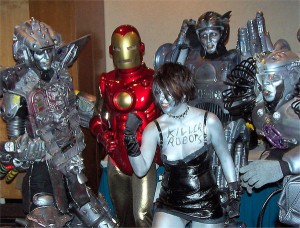Robots
Lego Sudoku Solver
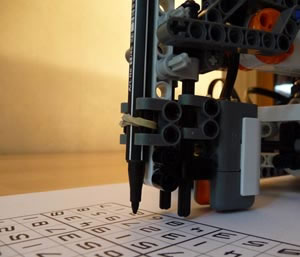
Posted By: mdb777 - Fri Sep 11, 2009 -
Comments (2)
Category: Games, Robots, Toys
Beijing theatre builds own Transformer
As part of promoting the new Transformer movie, this movie theatre created a VW Passat Transformer.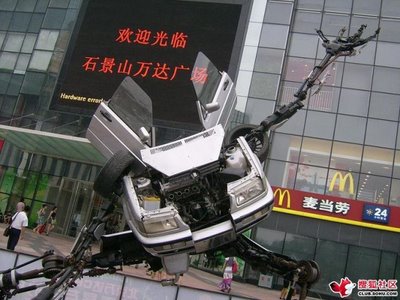
Here's a link to a story about the car and more pictures:
http://www.autoblog.com/2009/07/16/beijing-mall-builds-its-own-transformer-out-of-vw-jetta/
No information on if it really works.
Posted By: gdanea - Thu Jul 16, 2009 -
Comments (5)
Category: Robots
Bud Battle Bots
I'm not sure why Budweiser has some of the best commercials; perhaps the creative staff is under the influence of the product.No mercy!!
Posted By: gdanea - Tue Jul 07, 2009 -
Comments (2)
Category: Robots
A Third Helping of Food Related Weirdness
A UK school has banned students from including bananas in their lunchboxes, because one teacher has a severe allergy to them. The teacher from the Plymouth school is said to have a "potentially fatal" reaction to bananas (so is presumably also unable to visit supermarkets or parks), causing her council employers to recommend the fruit be excluded from her work environment (Mirror)
Speaking of odd flavours, here's a two-fer. First up, the Double-Down Saloon is offering two-for-the-price-of-one on it's 'eye watering' bacon-vodka martini on Jun 19th, in celebration of National Martini Day (Examiner). Also, a UK barman hopes to beat the credit-crisis this summer by selling beer flavoured ice-cream. The barman, David Wardleworth, is keeping the exact recipe a secret beyond saying that is does include "Thwaites Original" British cask ale. Despite a historic reputation for liking their beer warm, the ice-cream is apparently proving popular with the British public (Burnley Express).
And it turns out weird flavours are not the only way the recession is impacting the world of ice-cream. The poor economy, combined with lower gas prices, has apparently fuelled a boom in ice-cream trucks, whose drivers stand to make from $100 to $200 a day. And it's not just the money and the lure of being your own boss that drivers find rewarding, according to driver John Jones "You get to see a lot of happy people, you get a lot of smiles." (Wichita Eagle).
And the ice-cream business certainly looks about to boom in Linden, NJ, where police are preparing to hand out tickets for free ice-cream to any kids they see wearing a helmet when cycling; the tickets will also include information about a recent law change, that makes helmets compulsory for under-17s. Even better, no child will be left out as the Brain Injury Association of New Jersey is supplying free cycling helmets for children, also available from those friendly boys in blue (My Central Jersey).
More in extended >>
Posted By: Dumbfounded - Tue Jun 16, 2009 -
Comments (7)
Category: Food, Health, Jobs and Occupations, Politics, Robots
Transformers Are Real! ... Well, Sort Of
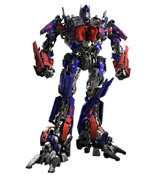
Posted By: Nethie - Mon Jun 08, 2009 -
Comments (3)
Category: Inventions, Motor Vehicles, Puppets and Automatons, Robots
Eyeborg
Rob Spence, a filmmaker in Canada, who lost his right eye has now replaced that eye with a camera. Engineer Kosta Grammatis designed a video camera and transmitter that would fit into a prosthetic eye. Just think of all the possibilities. Waring: video does contain a very brief scene of eye surgery in the beginning. EyeborgEyeborg Phase II from eyeborg on Vimeo.
Posted By: mdb777 - Tue Jun 02, 2009 -
Comments (1)
Category: Body Modifications, Robots, Video, Experiments
So, We Taste Like Bacon?
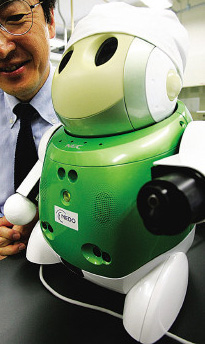
Ever wondered what human flesh would taste like but you've never been trapped in the Andes due to a horrific plane crash? Then this cute little robot has the answer. Designed by researchers in Japan, the Winebot is supposed to be for sorting different types of wine, cheese and hors d'oeuvres. But when a reporter placed his hand against the sensor, he was declared to be "bacon". Anyone care to confirm?
Posted By: Nethie - Mon May 04, 2009 -
Comments (7)
Category: Animals, Body, Cannibalism, Inventions, Robots
The Hopkins Beast
 Back in the early 1960s, researchers at the Johns Hopkins University Applied Physics Lab created one of the first autonomous robots. They called it "The Beast." From Popular Science, Sep 1964:
Back in the early 1960s, researchers at the Johns Hopkins University Applied Physics Lab created one of the first autonomous robots. They called it "The Beast." From Popular Science, Sep 1964:The picture of "The Beast" comes from frc.ri.cmu.edu.
Posted By: Alex - Mon Dec 22, 2008 -
Comments (3)
Category: Robots, Technology
The Killer Robots
Those for whom GWAR no longer is sufficient might like to check out The Killer Robots. Here is their MySpace Page.
Posted By: Paul - Tue Oct 21, 2008 -
Comments (9)
Category: Costumes and Masks, Music, Robots

| Who We Are |
|---|
| Alex Boese Alex is the creator and curator of the Museum of Hoaxes. He's also the author of various weird, non-fiction, science-themed books such as Elephants on Acid and Psychedelic Apes. Paul Di Filippo Paul has been paid to put weird ideas into fictional form for over thirty years, in his career as a noted science fiction writer. He has recently begun blogging on many curious topics with three fellow writers at The Inferior 4+1. Contact Us |

